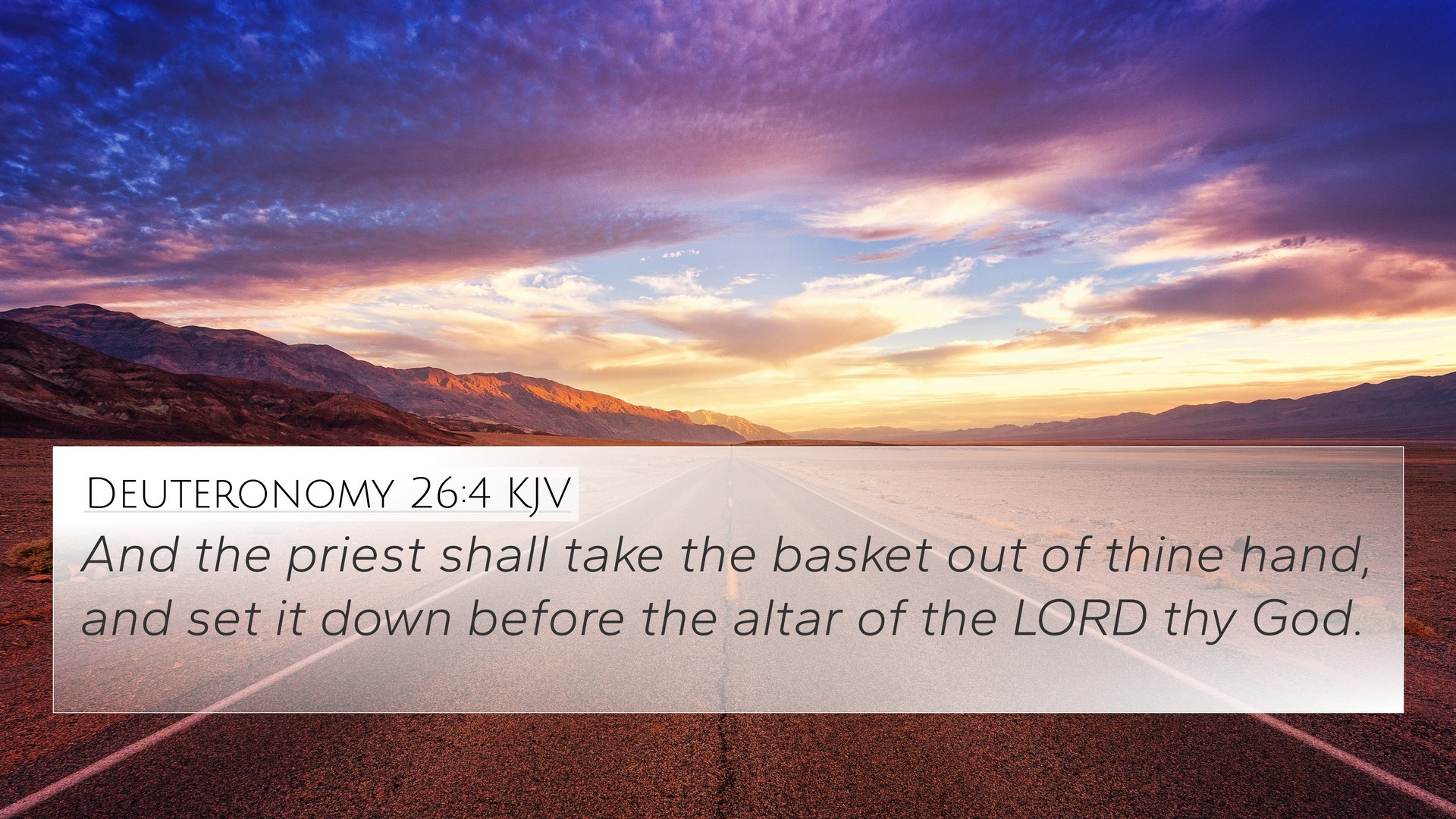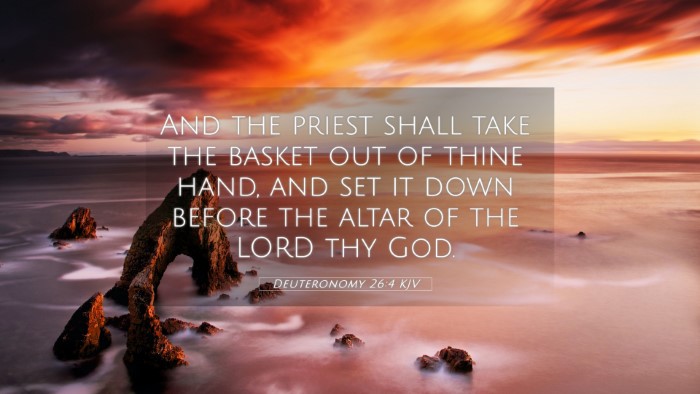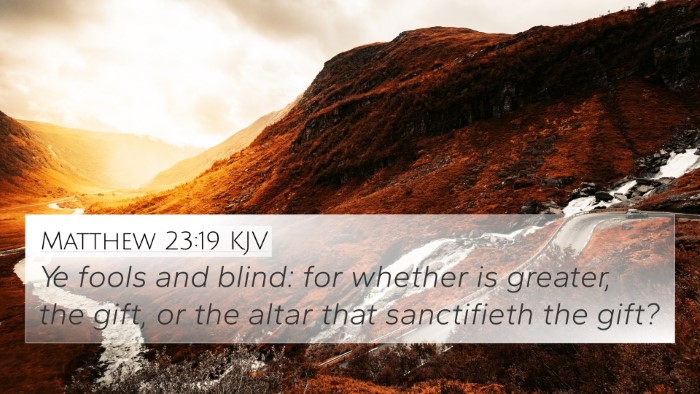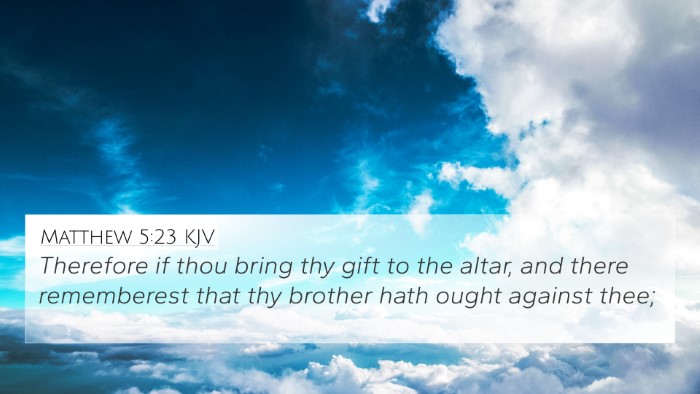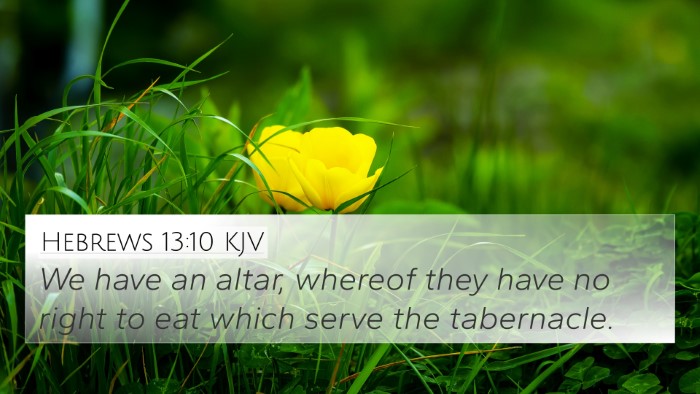Interpretation of Deuteronomy 26:4
Verse Text: Deuteronomy 26:4 states, "And the priest shall take the basket out of your hand, and set it down before the altar of the Lord your God."
This verse is part of a larger passage that outlines the process of offering firstfruits, a key aspect of Israelite worship and a reminder of God's provision. Below we explore various interpretations and insights from notable public domain commentaries.
Meaning and Context
The act described in Deuteronomy 26:4 signifies a deep-rooted acknowledgment of God’s blessings. The firstfruits offering symbolizes gratitude and recognition of God as the ultimate provider. Before delving into the detailed interpretations, let’s identify several themes and cross-references related to this verse:
- Gratitude: A core theme in the biblical narrative, as seen in 1 Thessalonians 5:18.
- God's Provision: Referenced in Philippians 4:19, affirming God's ability to meet needs.
- The act of offering: Mirrored in Romans 12:1 as a call to present our lives as living sacrifices.
- Priestly ministry: Connected with Hebrews 5:1, where the role of the priest is elucidated.
- Covenantal relationship: Explored through Exodus 19:5, highlighting God's promise to Israel.
- Firstfruits in worship: Mentioned in Proverbs 3:9, where honoring God with wealth is emphasized.
- Celebration of abundance: Illustrated in Nehemiah 8:10, where joy in the Lord is underlined.
Commentary Insights
Matthew Henry's Commentary: Matthew Henry highlights that this ritual of presenting the firstfruits is an act of thanksgiving. It is not merely a ceremonial duty but an expression of the relationship between God and His people. He notes that it demonstrates an acknowledgment of God's providence in the land flowing with milk and honey. The priest’s role in this process signifies the mediation between God and man, emphasizing the sacredness of the offering.
Albert Barnes' Commentary: Albert Barnes elaborates on the significance of putting the basket down before the altar. He interprets this as an act of humility and dependence upon God. The act of the priest receiving the offering is seen as pivotal since it signifies the acceptance of the people's gratitude by God through His appointed mediator. Furthermore, Barnes points to the necessity of community in worship: this act is not just personal but a collective acknowledgment of God's provision among the Israelites.
Adam Clarke's Commentary: Adam Clarke provides a theological reflection on the symbolism of firstfruits. He notes that these offerings are not only a way to acknowledge what God has provided but also a precursor to the larger concept of offering oneself entirely to God. Clarke suggests that the firstfruits foreshadow deeper principles of sacrifice and dedication, ultimately leading to the New Testament teachings of giving oneself as a spiritual offering, highlighting a seamless connection across the scriptures.
Thematic Connections
The themes evident in Deuteronomy 26:4 connect to broader biblical narratives. Here are a few connections:
- Firstfruits and thanksgiving: The significance of giving the first portion to God is echoed in Leviticus 23:10-11.
- Priestly roles in worship: The relationship between offering and priesthood can be traced through the establishment of the Levitical priesthood in Numbers 3:5-10.
- Divine promises and their fulfillment: This act serves to remind Israel of the covenant mentioned in Deuteronomy 7:12-13.
- Faithfulness in offerings: The need for sincere offerings is echoed in Malachi 1:8, which critiques insincere worship.
Cross-References for Deuteronomy 26:4
Several verses across both Testaments provide a rich fabric of themes interconnected with Deuteronomy 26:4:
- Genesis 14:20: Melchizedek's blessing of Abraham and the giving of a tenth.
- Exodus 23:19: “The first of the firstfruits of your land you shall bring into the house of the Lord your God.”
- Proverbs 3:9: “Honor the Lord with your wealth, with the firstfruits of all your crops.”
- 1 Corinthians 15:20: Christ as the firstfruits of those who have fallen asleep.
- James 1:18: Believers as a kind of firstfruits of God’s creation.
Conclusion
Deuteronomy 26:4 stands as a pivotal verse that intertwines gratitude, worship, and recognition of God’s providence, framed within the larger narrative of Israel's covenantal relationship with God. Through various commentaries, we glean an understanding that deepens our scriptural cross-referencing. Such insights help in exploring how this verse connects with others throughout scripture, enriching our understanding of both the Old and New Testaments.
By employing tools for Bible cross-referencing, one can uncover these connections, enhancing personal study and communal worship experiences. Understanding the relationships between these verses invites deeper theological reflection and inspires a lifestyle of gratitude toward our Creator.
